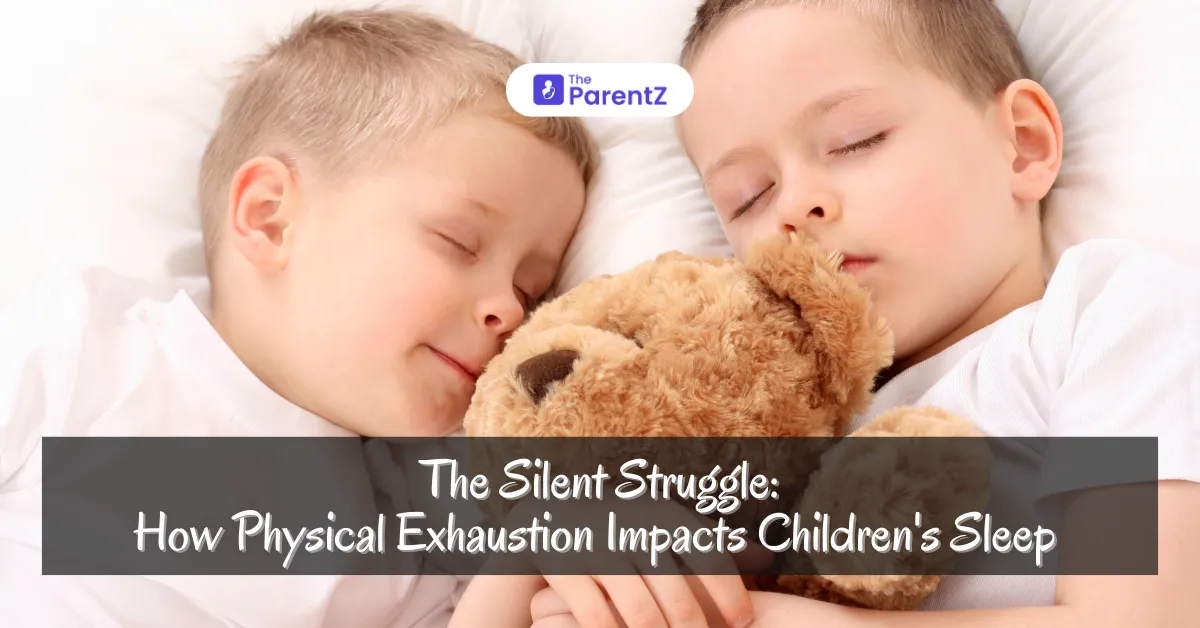Today, let's talk about something we've all experienced – that magical moment when you think, "Wow, they're going to sleep SO well tonight!" after a day of non-stop play. But here's the twist: more activity doesn't always equal better sleep. In fact, it's way more complicated than that. Let’s explore this topic in detail, to help you make informed decisions for your children.
The Myth of "Tired Equals Sleepy"
We've all been there. You've watched your kid run, jump, climb, and play until they're practically vibrating with energy, thinking they'll crash the moment their head hits the pillow. But sometimes, the opposite happens. Physical exhaustion isn't a guaranteed ticket to dreamland – it's more like a complex dance between energy, body chemistry, and individual needs.
When children engage in high levels of physical activity without adequate rest and recovery, they can become physically exhausted.
Signs of Physical Exhaustion
Recognizing the signs of physical exhaustion is crucial for parents. Children may not always articulate their feelings of tiredness, so being observant is key. Common signs include:
- Increased crankiness or irritability: Tired children may have shorter tempers.
- Difficulty focusing: You might notice them struggling to concentrate on tasks or homework.
- Frequent yawning: This is a classic sign that they need rest.
- Physical collapse: They might suddenly lie down or fall asleep during the day.
- Changes in appetite: Exhaustion can lead to either overeating or loss of appetite.
The Goldilocks Zone of Physical Activity
Too Little Activity
Imagine a day with minimal movement – sitting, watching screens, minimal physical engagement. These days can lead to:
- Restless nights
- Difficulty falling asleep
- Increased anxiety
- Reduced sleep quality
Too Much Activity
Surprisingly, over-exhaustion can be just as problematic:
- Increased cortisol (stress hormone)
- Difficulty calming down
- Overstimulated nervous system
- Interrupted sleep patterns
How Physical Exhaustion Affects Sleep
- Difficulty Falling Asleep: Paradoxically, while exhaustion might seem like it would make a child fall asleep quickly, it can actually lead to difficulties in settling down. Overstimulated bodies may struggle to relax enough to fall asleep.
- Restless Sleep: Exhausted children might experience restless nights filled with tossing and turning rather than deep, restorative sleep. This can prevent them from reaching the deeper stages of sleep that are crucial for recovery.
- Increased Nightmares or Night Terrors: Some studies suggest that extreme fatigue can lead to an increase in nightmares or night terrors, disrupting sleep further.
- Daytime Fatigue: Ironically, after a night of poor sleep due to physical exhaustion, children may wake up feeling even more tired and irritable than before.
Strategies for Balanced Activity and Sleep
Not all physical activity is created equal. Timing is everything:
- Morning and early afternoon activities: Positive sleep impact
- Late evening high-intensity play: Potential sleep disruption
- Calm evening activities: Promotes relaxation
Here are some practical parental tips:
1. Establish a Routine: Creating a consistent daily routine that includes time for both active play and rest is essential. Children thrive on predictability, which helps them understand when it’s time to play hard and when it’s time to wind down.
2. Monitor Activity Levels: While it’s important for children to engage in at least 60 minutes of physical activity each day, this doesn’t mean they should be overscheduled with sports or activities. Encourage unstructured playtime where they can engage freely without pressure.
3. Prioritize Rest Days: Just like adults need days off from intense workouts, children also benefit from rest days where they can engage in lighter activities or simply relax at home.
4. Create a Calming Bedtime Routine: A calming bedtime routine helps signal to your child that it's time to wind down after an active day. Activities such as reading together, taking a warm bath, or practicing relaxation techniques can help prepare their bodies for sleep.
5. Encourage Healthy Sleep Hygiene: Teach your children about good sleep hygiene practices:
- Set consistent bedtimes and wake-up times.
- Limit screen time at least an hour before bed.
- Ensure their sleeping environment is comfortable—cool, dark, and quiet.
Conclusion
Understanding the impact of physical exhaustion on sleep is vital for promoting your child's health and well-being. By finding the right balance between active play and rest, you can help ensure that your child not only enjoys their daily activities but also gets the restorative sleep they need to thrive.









Be the first one to comment on this story.